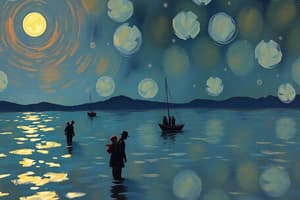Podcast
Questions and Answers
Which event marked the beginning of the First World War?
Which event marked the beginning of the First World War?
- The signing of the Treaty of Versailles
- The Russian Revolution
- The bombing of Pearl Harbor
- The assassination of Archduke Franz Ferdinand (correct)
What was World War I often referred to as?
What was World War I often referred to as?
- The Imperial Conflict
- The Great Revolution
- The War to End All Wars (correct)
- The War of Nations
Which conflict led to the end of colonial empires?
Which conflict led to the end of colonial empires?
- The Vietnam War
- World War II (correct)
- The Korean War
- The American Civil War
During which period did the Cold War occur?
During which period did the Cold War occur?
What major impact did the fall of the Berlin Wall have?
What major impact did the fall of the Berlin Wall have?
What characterized the latter half of the 20th century according to the text?
What characterized the latter half of the 20th century according to the text?
How did the decolonization movement impact the world order?
How did the decolonization movement impact the world order?
What played a significant role in the rise of globalization in the latter half of the 20th century?
What played a significant role in the rise of globalization in the latter half of the 20th century?
What event marked the beginning of the end of the Cold War era?
What event marked the beginning of the end of the Cold War era?
What defines the modern interconnected world according to the text?
What defines the modern interconnected world according to the text?
Flashcards are hidden until you start studying
Study Notes
Journeying Through History: World Wars and Modern Times
Digging into the annals of human history, we find a complex tapestry woven by the tumultuous events of world wars, shaping our collective memory and guiding the course of modern civilization.
World Wars
The Great War
The first global conflict, World War I (1914-1918), emerged from a complex web of alliances, national rivalries, and imperial ambitions. The assassination of Archduke Franz Ferdinand ignited the fuse, launching an era of unprecedented carnage and destruction. This war, often referred to as the "War to End All Wars," did not achieve its lofty goal, laying the foundation for the Second World War.
The Second Global Conflict
The Second World War (1939-1945) was a more devastating conflict than its predecessor, featuring the rise of totalitarian regimes and the horrors of the Holocaust. The war's outcome, however, saw the Allied Powers emerge victorious, marking the beginning of the Cold War and the end of colonial empires.
The Rise of Globalization and Modern History
The aftermath of World War II accelerated the globalization process, leading to profound changes in the world's social, economic, and political landscapes.
The Cold War
The Cold War (1947-1991) was a period of heightened geopolitical tensions between the Western powers (led by the United States) and the Eastern powers (led by the Soviet Union). In this era, the two superpowers engaged in a competition of ideologies, proxy wars, and an arms race that had a profound impact on global dynamics.
The Decolonization Movement
Beginning in the 1950s, many colonized nations gained their independence, ushering in a period of decolonization. This significant shift in the world order introduced a wave of newly independent nations that transformed the international landscape.
The Rise of Globalization
The latter half of the 20th century saw a surge in globalization, as the expanding world economy fostered international trade, increased foreign investment, and the growth of global institutions such as the World Bank and the United Nations. This period also witnessed the rise of multinational corporations and the proliferation of new technologies, including the internet and satellite communications.
The End of the Cold War
The fall of the Berlin Wall in 1989 marked the beginning of the end of the Cold War, a period of intense geopolitical tension and uncertainty. The peaceful dismantling of the Iron Curtain allowed for the reunification of Germany and the emergence of a new era of cooperation and multilateralism.
The Modern World
In the post-Cold War era, the world has experienced unprecedented changes, including remarkable technological advancements, the rise of global institutions, and the emergence of new powers. The world is now interconnected as never before, with economic, social, and cultural interdependence spanning the globe.
Conclusion
From the horrors of world wars to the triumphs and challenges of modern times, the journey through history has been a complex and fascinating one. As we continue to navigate the current landscape, it's essential to understand our past, to appreciate the progress we've made, and to recognize the challenges and opportunities that lie ahead.
Studying That Suits You
Use AI to generate personalized quizzes and flashcards to suit your learning preferences.




